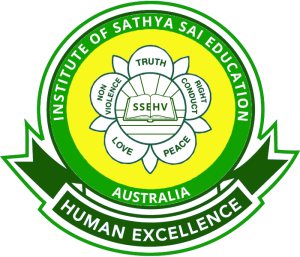EHV Certificate Course
Section outline
-

Course Summary
There is no doubt that there are problems in society everywhere – lack of peace and harmony between countries, in communities, in families and in individuals. A lot of young people are “lost” and even though they ask many questions, they really don’t know “who they are”. Somebody has to fix this situation, and the responsibility is falling to the schools and other community organisations. Too often, though, there is little time in the already packed curriculum and little guidance about how to achieve the important goals
The Institute of Sathya Sai Education (ISSE) is an international group of teachers, teacher educators and concerned community members who want to help to make a difference to “healing society’s ills”. It is a worldwide organisation with its headquarters in Thailand. Its aim is the research, development and implementation of a program that has already had a lot of impact in many countries, Sathya Sai Education in Human Values (SSEHV, also often referred to as EHV). This was started in India by a great teacher and educational philosopher, Sathya Sai Baba, and has now been adapted for use in more than 160 countries. It has special model schools in more than 30 countries.
This program is concerned with human excellence and the all-round development of the individual. Our work, as teacher educators, is to explore the best ways of bringing out this human excellence in schools without creating extra pressure for teachers and school leaders.
This professional development course has been developed by a team of experienced teachers and teacher-educators, based on a curriculum that is offered by ISSEs around the world. It is intended to provide teachers and other community members with the knowledge, skills and understanding to incorporate SSEHV, not as an add-on, but as a seamlessly integral part of the overall program. It can also be useful for parents, community group leaders or those who would like to enhance their workplaces.
The course consists of three modules. The first two modules each consists of two units. Each unit is made up of five lessons and requires approximately 48 hours of study, practical application and reflection. The third module is an individual project. Completion of all lessons is required to be awarded a certificate. Read more
The course structure uses a “flipped classroom” model in which participants are provided with information, in the form of pre-recorded lectures and assigned readings, to study at your own time, place and pace. You are then invited to put the ideas into practice in the context of your own daily life and reflect on the experience. Regular “real-time” sessions will be conducted at the end of each unit. Depending on the situation, these sessions may be online or face-to-face. These sessions will provide an important opportunity to share your experiences with other students and to learn from discussion with one another and the course facilitators.
We hope the tasks will challenge your thinking and your practices. Sometimes the approaches you try might not succeed at first attempt, but please always remember that you are the most important link because you are the ones who are directly shaping the children and youth who are our future.
-
Activities: 6
-
Activities: 70
-
Unit (1) – The Why and What of Education in Human Values
-
Unit (2) – The How of EHV
-
Unit (3) – Developing Competencies for EHV (Coordinator Roger)
-
Unit (1) – The Why and What of Education in Human Values
-
Unit (2) – The How of EHV
-
Unit (3) – Developing Competencies for EHV (Coordinator Roger)
-
